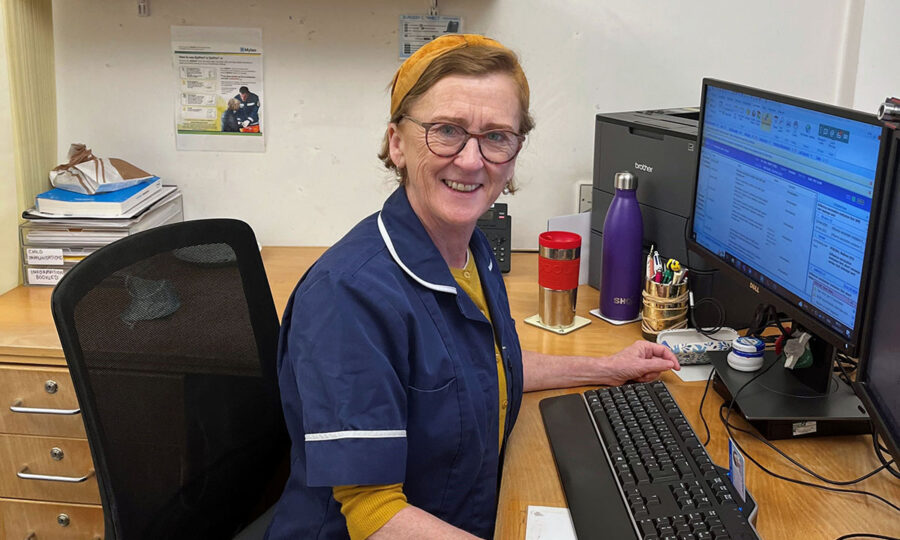In conversation with… Breda

Practice nurse Breda Redmond-Hunt at Mildmay Medical Practice on the importance of getting your children vaccinated
Tell us about your background. What brought you to nursing?
I’ve always worked with people: my very first job was working as a carer for disabled adults. Eventually, I ended up working for the NHS and was selected to go to university to study nursing. I graduated when I was 48 – just after I became a grandmother.
The beauty of my job is, I see people from all age groups, with different needs and questions. I work with people aged nought to 100! I’m just as likely to be giving a child a vaccine as I am to be helping an older person with a long-term condition.
How important are childhood immunisations?
Immunisations are important in protecting everybody from getting sick. Childhood vaccines allowed us to get to a point where we didn’t have measles in the UK. Unfortunately, we have since seen some cases, so it’s really important to make sure we vaccinate and protect our children.
What are some of the most common vaccines that are administered during childhood?
Babies are most at risk from not being vaccinated. Babies are given a dose of the six-in-one vaccine at eight, 12 and 16 weeks old. This protects against six different conditions, including polio, tetanus and hepatitis B. Throughout your childhood, you will also be offered vaccines for meningitis, measles, mumps, rubella, and more.
What should you do if your child has missed a vaccine?
We have a very safe schedule to help children catch up. The MMR (which protects against measles, mumps and rubella) can be offered even to adults if they’ve never had it. Sadly, the conditions that vaccinations protect against can be fatal, so it’s important to get the ones you need.
What are the most common misconceptions about vaccines?
There are many stories about the MMR vaccine – some people think it causes side effects, but it doesn’t. There is a lot of misinformation going around that has been proven to be false many times. We know from history that childhood immunisations protect children from diseases and do so very well. These vaccines have been around for a very long time and have been developed to be very safe. You wouldn’t get a nurse giving a vaccine to a baby if they thought it was unsafe – nobody would want to do the job.
Some parents can be quite shocked, for example, to hear that their one-year-old needs four different vaccines. Sometimes they tell us they want some of them, but don’t want others. But it’s perfectly safe to give children several vaccines at a time and it does not overload or weaken the immune system.
But it’s understandable that some people are unsure. I know from experience within my own community that people are more likely to trust someone they know really well, even if what they’re being told isn’t true. As a nurse, I have information ready to show people when needed. Often when you take the time to do this, they settle down and listen to you.
How do you help parents ensure they’re receiving accurate and trustworthy information?
The best things to give to parents who are nervous or hesitant are time and information, to allow them to come to their own decision. We always point people towards NHS resources, which have answers to parents’ most-asked questions. Each child also gets a little red book, which lists all the immunisations they’re expected to have. If you find something you’re not sure about, we will arrange a telephone appointment with you so we can discuss it.
How do you go about giving a vaccine to a child who is scared of injections?
We have tactics to calm them down. I’ve got a little egg timer with beautiful colours to distract them. They also get gorgeous stickers if they get their vaccine. Some people ask parents to bring in iPads, so kids can watch cartoons. Mums, dads or guardians also sometimes have a treat that the children can have when they’re done. When I’m doing a preschool booster, I always speak to the child to explain it might be a bit ouch-y, but it will be quick!
For more information, visit the vaccinations page of the NHS website
